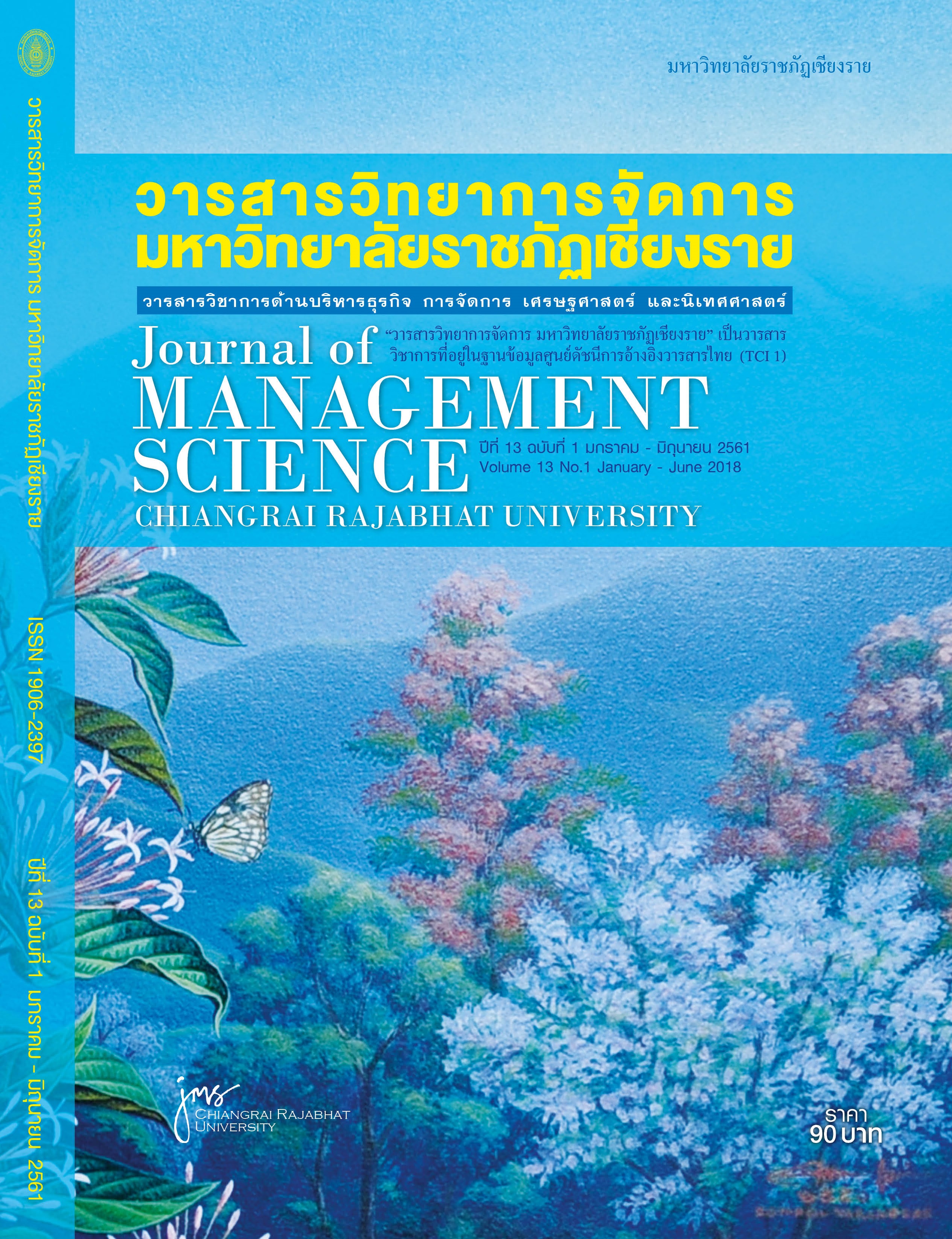ปัจจัยสำเร็จของหน่วยบ่มเพาะวิสาหกิจในสถาบันอุดมศึกษาของประเทศไทย
Main Article Content
บทคัดย่อ
การศึกษาปัจจัยสำเร็จของหน่วยบ่มเพาะวิสาหกิจในสถาบันอุดมศึกษาของประเทศไทย เป็นการศึกษาเกี่ยวกับปัจจัยที่ส่งผลต่อความสำเร็จในการบริหารจัดการหน่วยบ่มเพาะวิสาหกิจ และนำเสนอเป็นแนวทางในการบริหารจัดการหน่วยบ่มเพาะวิสาหกิจในสถาบันอุดมศึกษาของประเทศไทยต่อบุคคลหรือหน่วยงานที่เกี่ยวข้อง การศึกษาในครั้งนี้ใช้วิธีการวิจัยเชิงคุณภาพ โดยเก็บข้อมูลจากประธานเครือข่ายหน่วยบ่มเพาะวิสาหกิจในสถาบันอุดมศึกษาในประเทศไทยที่จัดตั้งขึ้นจากการสนับสนุนงบประมาณของสำนักงานคณะกรรมการการอุดมศึกษา กระทรวงศึกษาธิการจำนวน 5 เครือข่าย ประกอบด้วยเครือข่ายหน่วยบ่มเพาะวิสาหกิจภาคเหนือตอนบน ภาคกลางตอนล่าง ภาคใต้ตอนล่าง ภาคตะวันออกและภาคตะวันออกเฉียงเหนือตอนบน รวมทั้งสิ้นจำนวน 5 คน โดยมีเครื่องมือที่ใช้ในการเก็บรวบรวมข้อมูล คือ แบบสัมภาษณ์ วิเคราะห์ข้อมูลจากเนื้อหาโดยวิธีการตีความและสร้างเป็นข้อสรุป
ผลการศึกษาพบว่า ปัจจัยที่ส่งผลต่อความสำเร็จในการจัดการหน่วยบ่มเพาะวิสาหกิจในสถาบันอุดมศึกษาแบ่งเป็นปัจจัยภายนอกและปัจจัยภายใน โดยปัจจัยภายนอกประกอบด้วย นโยบายของภาครัฐ งบประมาณสนับสนุนจากภาครัฐ ความต้องการของตลาด ศักยภาพของผู้เข้ารับการบ่มเพาะธุรกิจ การให้ความร่วมมือของผู้มีส่วนได้ส่วนเสีย และวัฒนธรรมของผู้เข้ารับการบ่มเพาะธุรกิจ ส่วนปัจจัยภายในประกอบด้วย นโยบายของมหาวิทยาลัย งบประมาณสนับสนุนจากมหาวิทยาลัย ศักยภาพของผู้จัดการและทีมงาน การสร้างเครือข่ายพันธมิตร เทคโนโลยีและนวัตกรรม กระบวนการในการบ่มเพาะธุรกิจซึ่งประกอบด้วย กิจการการสร้างความตระหนักในการเป็นผู้ประกอบการให้กับกลุ่มเป้าหมายที่กำหนด กระบวนการคัดเลือกผู้เข้ารับการบ่มเพาะธุรกิจ กระบวนการถ่ายทอดองค์ความรู้หรือการพัฒนาศักยภาพของผู้เข้ารับการบ่มเพาะธุรกิจ กระบวนการพัฒนาศักยภาพผลิตภัณฑ์หรือบริการของผู้เข้ารับการบ่มเพาะธุรกิจ การสนับสนุนงบประมาณหรือการเชื่อมโยงแหล่งทุน การประเมินผลผู้เข้ารับการบ่มเพาะธุรกิจ ตลอดจนการดูแลติดตามหลังจากออกจากกระบวนการบ่มเพาะธุรกิจแล้ว การสนับสนุนสิ่งอำนวยความสะดวกทางด้านกายภาพต่างๆ แผนการบ่มเพาะธุรกิจ และการประชาสัมพันธ์หน่วยงาน
Article Details
ทัศนะและข้อคิดเห็นของบทความที่ปรากฏในวารสารฉบับนี้เป็นของผู้เขียนแต่ละท่าน ไม่ถือว่าเป็นทัศนะและความรับผิดชอบของกองบรรณาธิการ
เอกสารอ้างอิง
Ayawong, Naowarat. (2007). Business Incubation in Thailand and Challenging Future. Development and Future of Business Incubator in Thailand. October, 2007, 12-27. (In Thai)
Bayhan, A. (2006). Business Incubator Process: A Policy Tool for Entrepreneurship and Enterprise Development in a Knowledge-Based Economy. Competitiveness Support Fund.
BuoSonte, Rattana. (2009). Philosophy of Research. Bangkok: Chulalongkorn University Press. (In Thai)
Buys, A.J. & Mbewana, P.N. (2007). Key Success Factors for Business Incubation in South Africa: the Godisa Case Study. South African Journal of Science. 103(9-10), 356-358.
Cheewatrakoolpong, Kornkarun, et al. (2015). Changes in Mode of Trade in the World and the Impact on Mode of Trade, Exports and Structural Changes in Thailand. Retrieved June 25, 2017, from https://www.pier.or.th/wp-content/uploads/2015/10/aBRIDGEd_2015_006.pdf. (In Thai)
Gadamer, H & Linge, D. (2008). Philosophical Hermeneutics. University of California Press.
Gillotti, T. & Ziegelbauer, R. (2006). Seven Components of a Successful Business Incubator. Let’s Talk Business. 119, University of Wisconsin - Extension.
Havanon, Napaporn. (2009). Narrative Approach: The Turning Point of Social Science Research. Journal of Maekong Society, 5(2) May-August, 1-22. (In Thai)
Korthana, Thanaphol. (2017). Factors Influencing to the Success in the Implementation of Good Governance of Public Companies in Thailand. Journal of Management Science Chiangrai Rajabhat University. 12(2), 60-77.
Kumar, K.S., & Ravindran, D.S.R. (2012). A Study on Elements of Key Success Factors Determining the Performance of Incubators. European Journal of Social Sciences. 28(1), 13-23.
International business Innovation Association. (2015). Business Incubation FAQs. Retrieved July 28, 2015, from https://www.inbia.org/resources/business-incubation-faq. (In Thai)
Lincharearn, Aumporn. (2012). Qualitative Data Analysis Techniques. Journal of Educational Measurement Mahasarakham University. 17(1), 17-29. (In Thai)
Maesincee, Suvit. (2017). Thailand 4.0: Creating the New Economy and Crossing the Middle Income Trap. Retrieved November 16, 2017, from https://www.thairath.co.th/content/613903. (In Thai)
Maharattanasakul, Pravej. (2014). Principles and Methods for Theses and Dissertation Writing. Bangkok: Panyachon Distributor. (In Thai)
Mingmalairaks, P., et al. (2016). Value Creation and Core Competency Enhancement with Technology and Innovation Adoption in Thai Medium Sized Companies: A Case Study of the Car Materials Industry. GARCOMB. France.
Mingmalairaks, P. (2011). Innovation Adoption in Thai SMEs. Doctoral Dissertation. RMIT University, Australia.
Ministry of Industry. (2017). Critical Success Factor Analysis. Retrieved July 16, 2017, from https://www2.dip.go.th/Portals/0/ AEC/ปัจจัยแห่งความสำเร็จของผู้ประกอบการ.pdf. (In Thai)
Nawikan, Somyot. (2002). Concept: Strategic Management. Bangkok: Bhannakij Publishing. (In Thai)
Office of the Higher Education Commission (OHEC). (2017). Term of Reference for University Business Incubator (UBI): Fiscal Year 2017. Documentation for the Conference of Higher Education Development Network, Upper Northern Network (C-UBI). Chiang Mai. (In Thai)
Office of the Higher Education Commission (OHEC). (2016). Monitoring, Auditing, and Evaluating Report for the OHEC’s University Business Incubator (UBI) Establishment Pilot Project of of the Office of the Higher Education Commission. Bangkok. (In Thai)
Office of the Higher Education Commission. (2015). UBI: Step to Entrepreneurial Success. Bangkok: S-Print 2004 Co.,Ltd. (In Thai)
Office of the National Economic and Social Development Board. (2016). The Twelfth National Economic and Social Development Plan (2017-2021). (In Thai)
Oumtanee, Areewan. (2009). Quality Audit of Qualitative Data. Retrieved November 4, 2016, from www.krupai.net. (In Thai)
Peszynski, K. (2005). Power and Politics in a System Implementation. Deakin University.
Phophueksanand, Narong. (2013). Research Methodology: Principle and Concept, Research Writing Techniques. Bangkok: Expernet. (In Thai)
Pitaks, Kamron. (2015). 10 Years of UBI: from Past to Present. in UBI: Step to Entrepreneurial Success. (6-12). Bangkok: Office of the Higher Education Commission. (In Thai)
Plodpluang, Unya . (2013). Data Analysis in Phenomenology Studies. Nursing Journal of the Ministry of Public Health. 23(2), 1-10. (In Thai)
Podhisita, Chai. (2007). Science and Art of Qualitative Research. Bangkok: Amarin Printing and Publishing. (In Thai)
Punyayuttakan, Paiboon. (2017). Project Success Factor. Retrieved June 16, 2017, from https://www.knowledgertraining.com /index.php?tpid=0032. (In Thai)
Rattanangkul, Phatrasamon. (2015). Key Factors in the National Development and National Strategy for Sustainable Development. Retrieved July 6, 2015, from https://phatrasamon.blogspot.com/2009/11/ blog-post_26.html. (In Thai)
Srisuk, Kiatsuda. (2009). Research Methodology. Chiang Mai: Krong Chang Printing. (In Thai)
Thanasankit, T. (1999). Exploring Social Aspects of Requirements Engineering - An Ethnographic Study of Thai Systems Analysists. Unpublished PhD Thesis. University of Melbourne, Australia.
The National Business Incubation Association. (2015). About NBIA. Retrieved August 25, 2016, from https://www2.nbia.org/about_nbia/. (In Thai)
Thianprathuangchai, Mongkol. (2010). Hermeneutics Theory and Interpretation of Law. Naresuan University Law Journal. 3(1), 113-137. (In Thai)
Vadhanasindhu, Pakpachong, & Decharin, Pasu. (1999). Strategic Management and Business Policy. 2nd ed. Bangkok: Chulalongkorn University Printing House. (In Thai)
Wiggins, J. & Gibson, D.V. (2003). Overview of US incubators and the case of the Austin Technology Incubator. Int. J. Entrepreneurship and Innovation Management. 3(1/2), 56–66.


